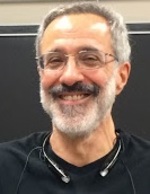About the Authors

Jean Bourgain
Past Professor
Department of Mathematics
Institute for Advanced Study
Princeton NJ 08540
https://www.ias.edu/scholars/bourgain
Past Professor
Department of Mathematics
Institute for Advanced Study
Princeton NJ 08540
https://www.ias.edu/scholars/bourgain
Jean Bourgain (1954-2018) received his Ph.D. from the
Vrije Universiteit Brussel in 1977. He was professor at I.H.E.S., the
University of Illinois, and from 1994, at
the Institute for Advanced Study in Princeton.
He worked on functional analysis, harmonic analysis,
ergodic theory, partial differential equations, number theory, and
combinatorics.
He was a recipient of the Fields Medal (1994), the Shaw Prize (2010),
and the Breakthrough Prize (2017).

Jeff Kahn
Professor
Department of Mathematics
Rutgers University
Piscataway NJ 08854
jkahn[ta]math[td]rutgers[td]edu
https://sites.math.rutgers.edu/~jkahn/
Professor
Department of Mathematics
Rutgers University
Piscataway NJ 08854
jkahn[ta]math[td]rutgers[td]edu
https://sites.math.rutgers.edu/~jkahn/
Jeff Kahn
received his Ph.D. from The Ohio State University in 1979,
under the direction of
D. K. Ray-Chaudhuri, and, following some time at MIT, has been at Rutgers since 1984.
He works on discrete mathematics and related topics, and is a recipient
of the Pólya Prize (1996) and the Fulkerson Prize (2012).

Gil Kalai
Professor
Einstein Institute of Mathematics
Hebrew University of Jerusalem
Jerusalem, Israel
and
Efi Arazi School of Computer Science
Reichman University, Herzliya.
kalai[ta]math[td]huji[td]ac[td]il
www.ma.huji.ac.il/~kalai/
Professor
Einstein Institute of Mathematics
Hebrew University of Jerusalem
Jerusalem, Israel
and
Efi Arazi School of Computer Science
Reichman University, Herzliya.
kalai[ta]math[td]huji[td]ac[td]il
www.ma.huji.ac.il/~kalai/
Gil Kalai
graduated from the Hebrew University of Jerusalem in 1983;
his advisor was Micha A. Perles. He works on geometric and
probabilistic combinatorics, convexity, and linear programming.
He is known for his blog,
his interest in
advancing women
in academia, and his “argument against quantum computers.”
